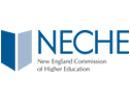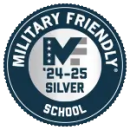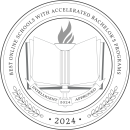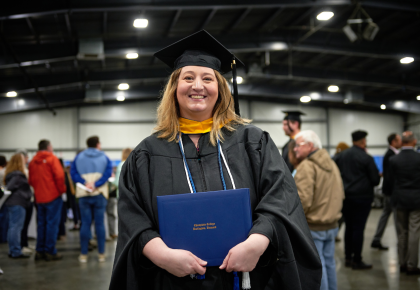Complete MATH-210
Unlock the Future with Data Science and AI
Champlain College’s online Bachelor’s in Data Science and Artificial Intelligence prepares you to excel in today’s data-driven world. Designed for innovators, this program integrates computer science, mathematics, and AI methodologies to give you the skills needed to lead in fields ranging from machine learning to data analytics. With an emphasis on cutting-edge tools and real-world applications, this program will propel your career in data analytics by leveraging and modifying the abilities of AI.
Finish your program faster with credit for prior learning and experience.
Differentiate your degree and get your resume noticed with an added certificate. Speak with your advisor for information.
Innovate with Data Science and AI
- Mathematical and Computational Foundations: Build a strong base in linear algebra, calculus, and discrete mathematics, essential for complex problem-solving in AI and data science.
- Proficiency in Programming and Algorithm Development: Master Python, R, and SQL programming languages to create efficient algorithms and data analysis solutions.
- Data Management and Analysis Skills: Gain expertise in relational and NoSQL databases, enabling you to design, manage, and query large datasets for data-driven decisions.
- Specialization in AI and Machine Learning: Learn to implement and optimize machine learning models, including neural networks and computer vision applications, to drive innovation in the use of artificial intelligence.
- Critical Thinking and Problem-Solving in AI: Apply theoretical and practical AI knowledge to solve industry challenges and innovate responsibly within data science.
Program Curriculum
Champlain's online data science and AI courses encompass the top skills needed by today's professionals. Graduates of the program are required to complete the following courses.
Professional Courses (57 credits)
- Quantitative Analysis (9 credits)
- Programming (12 credits)
- Database Management (6 courses)
- Data Analytics (9 credits)
- Artificial Intelligence (18 credits)
- Capstone (3 credits)
General Education Courses (42 credits)
General Electives (21 Credits)
Note: Some of the courses in this program are available in 15-week terms only. Please contact your advisor for details and information on how this may impact your time to completion.
This course covers the fundamental concepts of linear algebra and analytical geometry, including matrices, vectors, linear transformations, and systems of linear equations. Students will also explore the analytical geometry of Euclidean spaces, including lines, planes, circles, spheres, and conic sections. In this course, students will develop their mathematical reasoning skills and learn how to apply these principles to solve real-world problems.
Students will explore foundational concepts of calculus as they investigate limits, derivatives, and integrals, applying the product, quotient, and chain rules for differentiation and integration to algebraic, exponential, logarithmic, and trigonometric functions. Through problem-solving and real-world applications, students will analyze and optimize functions, sketch curves, and compute areas under graphs for both definite and indefinite integrals, and integrate by substitution and by parts.
This course introduces foundational concepts in discrete mathematics. Students will explore set theory, logic, and Boolean algebra, apply proof techniques like induction, and solve combinatorics problems using permutations and combinations. The course emphasizes graph theory, including trees, Euler and Hamilton paths, and algorithms, and examines functions and growth measures such as Big-O notation to develop critical problem-solving skills.
Prerequisites
From day one, students in this course are problem solving, first in terms of algorithmic design and then as early as week two via programming in the latest version of Python, using PyCharm. Students begin by writing a program to have a conversation, having strings and numbers as input, and advance, by week seven, to building a working password saver program, capable of looking up, adding (and encrypting), and storing passwords.
In this course, students will learn the R programming language and how to implement machine learning algorithms. They will explore fundamental R programming concepts and apply them to tasks such as data manipulation, visualization, and statistical analysis techniques. Through hands-on exercises and real-world examples, students will develop practical skills to tackle various machine learning challenges using R.
Python is a programming language with broad appeal because of its accessibility, community, sponsorship and utility. In this course students learn additional Python programming concepts and further develop their skills. Students progress from lists and basic structures to Object Oriented Programming, including objects, classes, encapsulation, abstraction modularity, memory management, inheritance and polymorphism. Students also learn advanced Python language features such as iterators and generators, along with error and exception handling.
Prerequisites
Complete CMIT-135
In the Computational Logic course, designed for students pursuing a BS in Computer Science, students learn formal methods for reasoning about programs, covering propositional and predicate logic, as well as proof techniques and automated reasoning tools. Students will learn how to model problems and construct logical arguments, and explore how logic can be applied to software engineering and artificial intelligence. Through hands-on work, students will develop skills in formal reasoning and problem-solving
Prerequisites
SDEV-340 C++ Programming II OR CMIT-235 Advanced Python. AND MATH-270 Discrete Mathematics
Learn the basics and more in this course on Relational Database Management Systems (RDBMS) and SQL (Structured Query Language). Students propose a final project in the first module and then work, week-by-week, to design, create, and populate the database. Then, students learn to create queries and stored procedures.
In this course, students will learn about NoSQL database systems and their applications in cloud-based environments, focusing on artificial intelligence and big data analytics. They will explore the fundamental concepts of non-relational databases, including document-oriented, key-value, column-family, and graph databases. Students will gain skills in designing, implementing, and optimizing NoSQL solutions for AI applications, tackling challenges such as high-volume data ingestion, real-time processing, and efficient querying of large-scale datasets.
Data analysis is a challenging, interdisciplinary process that requires an understanding of how data is generated, analyzed, interpreted, and presented. In this course students explore introductory data analysis techniques using relevant languages and tools to extract meaning from data to produce and inform solutions.
Prerequisites
Complete MATH-170 and CMIT-135
Advanced data analysis requires data to be retrieved, sorted, filtered, and more using relevant languages and tools. In this course students explore advanced data analysis techniques such as joining and manipulating tables, and constructing queries and sub-queries. Students also learn to evaluate the results and quality of analyses, and communicate outcomes effectively.
Prerequisites
Complete DATA-200 and CMIT-235
Data mining is a multidisciplinary field focused on discovering patterns and associations in data. In this course students gain proficiency in supervised data mining techniques for building prediction models including decision trees, random decision forests, bootstrapping, training and testing using multi-fold cross validation and using entropy measures for weighting features. Students also learn to use unsupervised data mining techniques such as clustering and association analysis.
Prerequisites
Complete DATA-200
In this course, students will learn key concepts and techniques in Machine Learning (ML) and Artificial Intelligence (AI). They will explore applications such as computer vision, natural language processing, and robotics. Through a combination of theoretical foundations and practical exercises, students will implement algorithms and develop AI systems using modern ML frameworks. This course also prepares students for more advanced study in the field.
Prerequisites
Take MATH-190 and DATA-200. Take CMIT-145 or CMIT-135.
In this course, students will learn practical skills in using popular Machine Learning libraries. They will work with real-world datasets to build, train, and deploy machine learning models. Students will implement common architectures like Convolutional Neural Networks (CNNs) and Recurrent Neural Networks (RNNs), gaining hands-on experience with various ML frameworks.
Prerequisites
ARTI-200 and CMIT-235
In this course, students will learn the fundamental concepts and practical applications of deep learning and neural networks in artificial intelligence. They will explore the architecture and training of various neural network models. Students will gain hands-on experience in building, training, and evaluating basic deep learning models using popular frameworks.
Prerequisites
ARTI-200, DATA-310
In this course, students will learn the core principles and techniques for interpreting and analyzing visual data from the world. They will delve into topics such as image processing, feature extraction, object detection, and image segmentation. Students will implement and evaluate computer vision algorithms using modern frameworks. Practical applications, including facial recognition, autonomous driving, and augmented reality, will be explored.
Prerequisites
ARTI-320
In this course, students will learn advanced techniques in neural networks, including convolutional networks, recurrent networks, and generative models. They will deploy deep learning models and explore applications in image recognition, natural language processing, and other fields. Hands-on projects and practical exercises will be emphasized.
Prerequisites
ARTI-320
In this course, students will learn Natural Language Processing (NLP), including text preprocessing, language modeling, syntax, semantics, and machine learning techniques for language understanding. They will explore applications such as sentiment analysis, machine translation, and text generation. Through a combination of theoretical concepts and practical exercises, students will build and evaluate NLP models using modern tools and libraries.
Prerequisites
ARTI-320
Students are presented with the opportunity to expand and showcase their knowledge and abilities in this 15-week course where they are expected to work independently and develop a project related to their major.
Prerequisites
Must complete 90 credits in major before taking this course.
In addition to the following requirements, students must also complete 3 Credits of a General Education Elective (Any ARTS, COMM, CRIT, ECON, ENGL, HIST, MATH, PHIL, PSYC, SCIE, SOCI, MKCM 120, CRIM except CRIM-225)
This course introduces students to the foundational concepts needed to communicate effectively in writing for academic study and professional development. Students will also learn to read critically to evaluate an author's message. Students will be introduced to rhetorical modes and their role in the development of written communication. Students will also learn how to use revision strategies to create written communication that meets its intended purpose for its intended audience
This course builds on students' proficiency in the writing process and rhetorical modes to introduce the use of sources in written communication. Students will practice information literacy as they learn to determine information needs from sources, develop effective search strategies, and incorporate sources in written communication, legally and ethically.
Prerequisites
Complete ENGL-100
Starting with a frame of human communication as a dynamic system of interactions in which people make choices that impact their relationships, other people, and themselves, students will define theory-informed communication concepts and processes, and critically examine how they apply to everyday life across a variety of contexts. Students will reflect on how the theory, concepts and processes apply to their own lives in becoming competent communicators who are knowledgeable, skilled, and versatile.
This course examines the principles of effective small group interaction. Students will analyze group development stages and small group roles. They will identify and evaluate communication skills that enhance small group cohesion and problem-solving. Students will explain how conflict affects group processes and compare face-to-face versus digital collaboration environments. These skills prepare students to participate effectively in group settings across academic, professional, and community contexts.
Students will learn and apply critical inquiry skills to analyze persuasive communication created by others and to develop persuasive communication/arguments of their own to solve problems in professional, civic, social, and personal contexts. Specifically, students will learn to recognize fallacies in logic; apply inductive and deductive reasoning strategies to the interpretation and development of persuasive communication; evaluate the validity of sources; and develop logically sound persuasive communication. Students will explore the roles of self-awareness, empathy, and ethics in the context of critical inquiry and the development of arguments.
Prerequisites
Complete ENGL-110.
This course explores the complex and evolving relationship between human beings and technology. Through a multi-disciplinary approach that draws on fields such as sociology, psychology, philosophy, and history, students will examine the ways in which technology has shaped human culture, identity, and values, as well as how humans have influenced and continue to influence the development, adoption and use of technology.
This course is an historical overview, and examination of the evolution of digital, film, and print media, and their functions. Students will identify and analyze contemporary problems of the media such as the legal, social, economic and psychological implications of their relationships with society. They also will examine the ways in which marketing and PR professionals utilize the mass media channels to reach their intended target audiences.
This course introduces students to basic statistics for data literacy. With a focus on exploring real-world data, students will interpret numerical information and utilize the tools necessary to complete the entire statistical process: designing a study; gathering, organizing, and analyzing sample data; and making inferences about a population. Students will demonstrate data-driven decision-making and effective communication of numerical data.
Introduces students to the biochemistry and physiology of nutrition and exercise. Emphasis will be placed on human body systems such as musculoskeletal, digestive, respiratory and circulatory, and their relationship to nutrition and fitness. Students will also study the biochemistry of energy conversion as it relates to exercise physiology. Laboratory sessions are designed to reinforce, by a hands-on approach, the principles discussed in lecture. Course includes two laboratory hours per week.
Students will develop the ability to apply scientific methods to understand the natural world, to identify scientific aspects of daily life, and to evaluate the quality of scientific information based on its source and the methods used for its generation.
This course will introduce students to major streams of social justice thought, including historical social justice movements, theoretical problems having to do with social equality, personal freedom, marginalization, and stigmatization, and the ways in which civic and professional communities respond to these issues.
With pressure and release, a window opens and closes, recording light on a sensor. The simple action captures the instinct, judgement, and skill of the person behind the lens. This class will begin a study of the art and craft of photography. Students will develop their vision and their understanding of how to achieve it. Solid skills will be learned and many doors will be opened.
A survey of the continuing change experienced in art since the 15th century. Students will examine how an image is achieved as well as the significance of the subject represented. Individual inquiry concerning the nature of art is encouraged.
Students learn to appreciate films through the critical analysis of various elements of mise-en-scene, cinematography, editing and sound. The course introduces the conventions of classical Hollywood cinema, considers the work of one major director (auteur), and surveys selected international and independent films. Students view and discuss films each week.
Students in the course will explore the cultural history of the music genre broadly referred to as rock. Students will explore the social, economic and political contexts that are influenced by and that influenced each style in the United States. By listening, watching, reflecting upon, discussing and writing, students will explore how music takes on meaning, personally, and culturally. Topics and themes include the relationships between and among gospel, country, funk, folk, disco, rap and hip hop; the role of business and technology in those relationships, and political or transgressive elements of rock music.
In this course, students will investigate how communication practices and processes shape organizations across settings such as businesses, nonprofit, and civic organizations. By examining case studies, applying theory to practice, and reflecting on their own experiences and observations, students critically analyze how communication impacts collaboration, conflict management, and organizational change. Students will explore the role of digital and mediated communication and how organizations communicate externally with stakeholders, partners, and the broader environment.
Students will learn how to create conditions for successful conflict engagement, a necessary skill for any professional. The course focuses on the foundational capacities to remain calm and connected with oneself and others. In this state students can access helpful ideas and responses and be their best selves regardless of environment. Improving facility for conflict creates stronger relationships and reduces fear. By the end of the course, students will understand that disagreement and difference can become a source of personal and interpersonal growth.
Ethics refers to accepted standards of right and wrong that prescribe what humans ought to do in various contexts, typically in relation to rights, obligations/duties, benefits to society, fairness, consequences, and virtues. In this course, students will explore both theoretical and practical dimensions of ethics in order to 1) define ethics and identify ethical positions and principles, 2) critically reflect on how ethics impacts individual and collective responsibility, decision-making, and action, and 3) apply ethics to the personal, civic, and professional contexts.
Prerequisites
ENGL-110
In this course, students will explore and apply writing principles and techniques to effectively interpret and write technical workplace materials. Students will enhance and gain skills to communicate business and technical information by producing instructions, describing processes, applying document design elements, creating and integrating illustrations, researching and writing proposals and formal reports, and presenting content for decision-makers.
Specific application of common tools for writing in the working world. Students will be instructed in rhetorical strategies of professional writing including style, report formats, editing, document design, and integration of visual aids. Students will complete a semester-long writing project; oral and written reports associated with the process of problem-solving within the project will be included.
Prerequisites
ENGL-112 or COR-125
This course introduces students to the fundamentals of substantive criminal law. With this foundation for understanding the legal system students will identify the essential elements of crimes, including the criminal act, criminal state of mind, and jurisdiction. They will examine the rationale underlying criminal law, factors affecting criminal responsibility, and legal defenses. By analyzing real-world scenarios, students will develop skills to distinguish lawful from unlawful actions and prepare for advanced studies or careers in criminal justice.
This course focuses on the rules and procedures governing how the American criminal justice system must process individuals suspected, accused, and convicted of law violations.
In this course, students will explore the theory and fundamentals of criminal investigation, emphasizing practical applications for evidence handling and case development. Students will review basic responsibilities of investigators and protocols for report writing, evidence collection, and preparation of cases for trial. The curriculum examines investigative approaches for various crime categories, including violent offenses, property crimes, terrorism, and hate crimes, while introducing comparative perspectives from diverse legal systems.
Prerequisites
Take CRIM-120.
Students will study important themes in the social history of the United States since the Civil War. This course allows students to expand their critical thinking skills through an examination of primary and secondary sources. Themes might include: the evolving status of women; the immigrant experience; the concept of the American dream; the paradox of freedom vs. slavery; the minority experience; the tensions between social classes. Students will be evaluated primarily on writing assignments.
In this course, students will explore broad, foundational knowledge in psychology, including its history, major theorists and a survey of psychology subfields such as developmental, cognitive and social psychology. Students will also describe and assess the role of ethics and social responsibility in the study and application of psychological theory and practices.
In this class, students will explore how social relationships, groups, societies and culture develop and change over time. From a sociological theory foundation and employing the sociological imagination, students will examine the impact of social structures, institutions, and systems on individual lives. Students will apply sociological research methods to investigate sociological phenomena in their own lives.
Principles of Economics introduces the fundamental concepts of economics - the study of how people manage resources, and how they react to scarcity. This course focuses on both microeconomics (the behavior of consumers and companies) and macroeconomics (large-scale economic factors such as employment and interest rates), so that you'll gain a broad understanding of how a modern market economy functions, how decisions in business settings are informed by economics, and how economics applies to your everyday life.
Starting Fall 2026 the following changes will be made to the General Education curriculum:
- New category, Integration: CRIT 100 Mindsets for Modern Learning (3 credits)
- Social Science and Arts & Humanities categories combine, still just 6 credits required.
- General Education Electives: credits increase to 6
Additional Program Details
- Quantitative Analysis Proficiency: Apply key mathematical concepts, including linear algebra, calculus, and discrete mathematics, to solve complex problems in data science and artificial intelligence.
- Programming and Computational Skills: Design, implement, and optimize algorithms for data analysis, machine learning, and computational logic tasks.
- Database Management Expertise: Design relational and NoSQL databases, performing data manipulation, and executing complex queries to support data-driven decision-making processes.
- Competence in Data Analytics Techniques: Utilize data analytics techniques, from basic data analysis to advanced data mining, to extract meaningful insights and make data-informed predictions.
- Expertise in Machine Learning and AI: Implement, train, and optimize machine learning models using industry standard frameworks.
- Practical Application, Critical Thinking and Problem-Solving: Apply theoretical and skills-based knowledge of AI systems and data science practices to address industry challenges.
Design your own degree and enhance its value and focus by adding a certificate. Adding a certificate allows you to develop specialized skills, strengthen your résumé, and tailor your education to align with career goals. Choose from the undergraduate or graduate certificates on this page.
Note: To earn a certificate, you must speak with your advisor first. You must be officially enrolled in the certificate program before you complete the required courses in it — coursework completed prior to enrollment cannot be applied later, and certificates may not be added retroactively. Careful planning with an advisor is essential to ensure all policies and timelines are met.
Our admissions team seeks to admit students who:
- Demonstrate a solid academic foundation - a minimum 2.5 GPA is our recommendation, though exceptions may be made on a case-by-case basis for those who demonstrate a potential for academic success in other ways.
- Possess an aptitude for success in an online learning environment.
- Exhibit the ability to make a positive contribution to the Champlain College Online community.
To learn more about submitting transcripts, or requirements for home-schooled students, those educated abroad or returning students visit our Undergraduate Admissions page.
Our transfer credit evaluation team works hard to ensure you get the transfer credits you deserve, from a variety of sources including prior college credits, work experience and training, military training and experience, and more. Our goal is to help you graduate from Champlain College Online as quickly and affordably as possible. Visit our Transfer Credit Options page to learn more.
Champlain College Online's computer science faculty, led by Department Chair Richard Pickering, are expert practitioners in the field. Their industry expertise ensures that our curriculum is aligned with the needs of employers, and reflects the skills today’s IT systems professionals need for success. Classes led by our seasoned experts will give you real-world insight into the world of information technology, and create a rich community of career-focused learning.
Tuition & Costs
Online Undergraduate Tuition Fall '25 - Summer '26
Tuition & Costs
Online Undergraduate Tuition Fall '26 - Summer '27
* Alumni is defined, for this tuition rate, as any degree program graduate from Champlain College or Champlain College Online.
** Veteran rate effective Spring 2025, not retroactive
See the undergraduate cost of attendance and fees here
Affordability and Paying For Your Education
We provide a number of options to make your online education affordable, including preferred tuition for alumni, associate degree graduates, community college graduates, and military.
Chart a Path to Success in Today’s Top Tech Roles
A Bachelor’s in Data Science and Artificial Intelligence opens the door to high-demand careers across diverse sectors. As industries increasingly rely on data and AI, roles in this field are projected to grow by 22% over the next decade, offering competitive salaries and advancement opportunities.
*Source: Bureau of Labor Statistics, Computer and Information Technology Occupations
Top Careers for BS in Data Science and AI Graduates:
- Data Scientist
- Machine Learning Engineer
- AI Research Analyst
- Data Analyst
- Business Intelligence Analyst

Why Champlain
Champlain Community
"I was living in Mexico during my program, and there was a major earthquake. My advisor heard about it and called me the next day to find out how I was. It's that kind of personal touch that really makes Champlain special."

Academic Excellence and Recognition

Regionally accredited by the New England Commission of Higher Education

Designated as a Military Friendly School for our commitment to the military community
Ranked among the best by Tech Guide for game design and computer science

Named the among the best schools with accelerated bachelor's degrees by Intelligent.com
Meet the Program Director
Richard Pickering, PhD
- Computer Science
- Software Development
- Software Engineering & Project Management
- Web Design & Development
About
Dr. Richard Pickering is an Assistant Professor and the Program Director for Technology here at Champlain College Online. Richard has a Ph.D. in Teaching and Learning coupled with an MBA and numerous technology-related certifications.
Prior to Champlain, Dr. Pickering enjoyed a distinguished career blending pedagogical expertise with strategic leadership in program management and product development in the educational business sector.
Dr. Pickering also has held positions as Chief Executive Officer at Virtual High School Global Consortium, Chief Operating Officer at Victory Productions, various Program/Product Manager posts as well as Adjunct Professor appointments.

Get More Information about the Bachelor's in Data Science and Artificial Intelligence
Learn what you can expect from our online bachelor's in data science and artificial intelligence.

Download Program Guide
I acknowledge that, by clicking the "submit" button, I am giving my express written consent to Champlain College and its representatives to contact me about educational opportunities via email, text, or phone, at the phone number above, including my mobile phone, using an automatic dialer, or pre-recorded message. Message and data rates may apply. I understand that my consent is not a requirement for enrollment, and I may withdraw my consent at any time.






